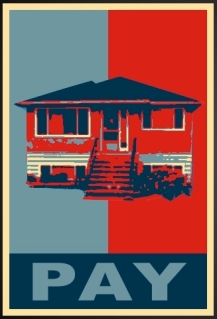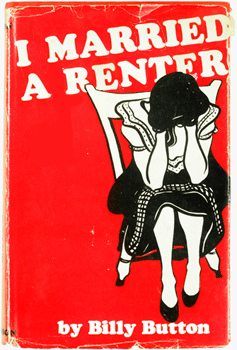In view of discussion on the previous thread, we add this chart for illustration and ongoing chat.
[This is a nominal average price chart, and the axes are linear.
Ideally one would do analysis of real, Case-Shiller type data on a logarithmic price chart.]
Greater Vancouver Average SFH Prices (as per REBGV):
2011-12: $1,064,249 (Current; down 13% from the peak; up 1.7% YOY)
2011-05: $1,223,421 (Historic peak)
2010-12: $1,046,348 (Ave price one year ago)
From a technical analysis perspective, despite numerous valid caveats, we note the following:
– Very steep channel support from 2009-2012 now violated to downside.
– Mild horizontal support comes in at $1M (‘big number support’ and 2010 congestion).
– Steep channel support from 2003-present still intact; bottom rail (support) now comes in at $935K-$970K for 2012. With added horizontal support at $935K, the $935K-$970K area is important through the coming year.
– The most important support level is arguably the lows of 2008-2009. We anticipate that, once the 2003-present channel gives, there will be a relatively quick move to $740K, a likely bounce there (to fool the folks who think that that is a superb entry point, given memories of 2009), before it is violated to the downside.
Ultimate support in $444K-$600K range, the likely bottom targets (thus 50%-66% off from peak).
May overshoot to downside, as often happens when such a massive generational speculative mania implodes.
If Shiller is right, and Vancouver SFHs ends up only increasing at the rate of inflation from the 1978-1986 region, ultimate support could be in the unimaginable $300K-$330K range. It’d probably take an economic depression to see those numbers.
—
Prior related posts:
Five Charts: Predicting Future Vancouver Housing Prices
11 Sep 2010


































Nothing but air all the way down to $740K.
We’d agree… that’s the most important first drop.
Who’s we?
Do you have elves putting together charts in your workshop?
hahaha.
Touche!
Excuse the affectation, if it seems like that… we like to use the first person plural… poetic license, and all that.
It just seems better than saying “I, I, I… ” all the time.
It seems to work on a blog.
Perhaps I should poll readers on this matter…
——
As always, at this point I am reminded of this exchange:
“He’s great”
“Who?”
“You”
“Oh… him!”
By the way, you get a mention on Scam Goods latest blog entry.
http://www.thekey.com/Blog.php/are-canadians-the-new-chinese
Same old crap from that lowlife.
BPOM -> Thanks for the heads-up, we hadn’t noticed that.
Saved, as a badge of honour, on our ‘VREAA Mentioned Elsewhere‘ page.
by “we” I believe he’s referring to himself and the doll that sits on his lap
For the record, ‘HarryS’ = one of the innumerable ‘dolls’ that sit on the lap of formula1/rusty etc, etc.
We get confused as to who exactly sits on whose lap there, though.
[impolite suggestion], rusty
The trouble with charts and statisitics can sometimes be the source of data, http://www.cnbc.com/id/45659547, why is this tolerated?
As I predicted many moons ago, the imaginary image of Asians rappelling from a hovering fleet of Cam Good’s own private choppers shall live forever as the principle symbol the worm had finally turned.
VREAA, the pumpers use whatever figures they see as proof that NOW IS A SUPERLATIVE TIME TO BUY REAL ESTATE. Oh, and to BUILD EQUITY. That last one always cracks me up. What a meaningless expression. Slimebags.
So you just keep on doing what you do here exactly as you’re doing it and we’ll all be the better for it. Thanks again for being one of the few voices of truth throughout the last year.
As for me, I proudly remain the lowly, less-than-human renter I became in 2010. Best thing I ever done did.
Gord -> Thanks. All the best to you and yours for 2012.
The helicopter stunt was our real estate markets version of “jumping the shark™”
But one of his passengers gave me a moment I’ll cherish forever when he said “Rocation, rocation, rocation”.
In response to “Realist” on the previous thread. There was a question on the disconnect of the “Larry” stats and the stats of a named West-side agency. The West Side detached is definitely up. December 2011 however was a strange month in that sales are down close to 50% over last year and several of the properties that actually sold were in the $5M+ range. This is skewing the average of Van-West (but won’t move the benchmark).
The overall REBGV average price is going down because the markets at the top end are down the most in sales volume – close to 50% Dec 2011 over Dec 2011. I had to go back to 2008 to see if it was worse for these markets and on a volume basis – it was not much worse. The only thing keeping the volume up right now is the attached market and the “entry” level prices where first time buyers can stretch themselves to buy a small box because they don’t see that they will not make money on it.
I’ve made my point but I had a chat with my sister in the past week who has already lost $50K (of the parents money) on her condo because it is down if value. She lives out of town and is thinking of moving back now. She is looking to buy something here. I basically told her that I would not allow it (not that I can stop her) and she was shocked to hear that renting could be good financially. I asked her how much she lost by owning – – and on first thought to that question- she still didn’t get it. I think she does now but I think people just don’t understand because they have only ever see people make money. Just wait until it goes the other way and we could see the sentiment of the young people and first time buyers change – then this game is really over in Vancouver.
Take a look at this rent to price index chart from Ben Rabidoux: http://theeconomicanalyst.com/sites/default/files/article_inside/2011/10/vancouver.jpg
By eyeballing his chart and looking at the rental price index, it looks like sale prices should be around 150% of 1992 levels to be in line with rents; which would be somewhere around $550-$625k. So similar conclusion different methodology. Maybe the TA does work!
Then again, if prices drop 55-60%, things might be such a mess that rents start to fall too, which could drive us down to the low $300s.
I think rent to price ratio would work if buyers weren’t so emotionally driven. When I hear things like, “I never realized before I started looking at new homes, but it’s important to me that no one else has ever used the bathtub before me.” Rent to price/maintenance/insurance ratios don’t have a leg to stand on against logic like that.
“and Vancouver SFHs ends up only increasing at the rate of inflation from the 1978-1986 region, ultimate support could be in the unimaginable $300K-$330K range”.
I think you’ll see this sooner than you expect – like next month! Keep your wallet open vreaa, you’ll be on easy street in no time.
http://www.cnbc.com/id/45186476/The_Euro_Event_Will_Cause_Depression_HSBC
http://www.telegraph.co.uk/finance/financialcrisis/8987886/Eurozone-collapse-starts-this-year-says-CEBR.html
These two links, read together, indicate the specter of another great depression, beginning in Europe and then spreading globally.
Recession seems imminent, great depression seems possible, perhaps even probable. So a 50 to 66 percent drop in housing prices is possible. During the last great depression real estate dropped as much as 90% in some places. And the US stock market dropped a little over 80%.
50-66%? this is classic theatre. You people are more entertaining by the day
Funny how 15% was “impossible” just a few months ago. Want to take some bets on the next impossible value? Let’s start simple, how about 20%? Is that impossible too? Let’s watch…
nice Gann lines VREAA ! – pretty classic chart pattern with the three. It would be nice to have the confirming transaction volume as well (for all the non-technicians). You’ll be able to copy that chart into your scrap book as a classic example of a market top and correction. I’d say your first support area is in play for 2012. If there’s a gap down in prices with enough listings, I doubt that the 2008 high will even hold through 2013. Who knows how fast the 50% retracement to 800 comes – could be a couple of years or thirty but the chart is certainly very bearish from current levels. thanks.
Steep rise and steep decline for ’11.
Looks like a perfect storm of olympic hangover, asian hype, greed, cheap money and now exhaustion, fear and a debt hangover. End of the world for some in 2012 I’m sure.
Why do some see it necessary to dump huge amounts of their income into interest and mortgage for speculative gains 20-30 years down the road ? Why not rent and enjoy life now, while you are younger and healthier ? Would you rather take a 5 star vacation at 35 or 65 ? Build a business now or at retirement age ? Set your kids up with an education investment plan ? Live now ! Save now ! Get over sky high real estate.
Very good analysis.
Did some charting a while back and now pay for a good charter for analysis on markets.
Personally i think your on the money.
The pinnacle was so steep, and the drop so severe. How often do you see such a severe top? Its quite stunning. As well as totally insane.
is it possible to show your chart using a log/semi-log chart? i believe that would be a much better way to show percent changes during the price run ups, and much easier to compare what is happening now. thanks.
Very interesting VREAA. I have no opinion as to the value of technical analysis but am struggling to find a reason why there should be support for prices at the 2008 lows.
For liquid assets I can see how the recent price movement can motivate the market because the actors are likely to be the same people i.e. those who bought/sold the asset before at a certain price.
However, with RE I think the current buyers/sellers are mostly different from those back in 2008. Thererfore, a the potential buyer who is looking at RE when we reach 2008 levels will not be informed or interested in what happened in 2008. They will only be focussed on what’s happening now.
Or am I wrong? Is the market made by the speculators/flippers/investors who do take account of such things?
If you bought in 2008 and 5 years later prices were at the same level or lower, would that not provide some incentive for you to re-evaluate your financial decisions in general especialy if you purchased with leverage? It’s the historical transaction record of all buyers and sellers that determines the psychology and, therefore, the direction of the market.
That looks like a “classic bubble” chart. Next stop would look like somewhere around the 740 range sometime this year (summer possibly, or probably fall). If that fails, there will be serious pain – think Phoenix.
I also agree that the ultimate destination for the price action is around the 444 range in a couple of years. Spring will be interesting this year in Van.
First, we have to see what F and C bring to the table.
10/25 anyone?
To: Harry S
Did you even read the two articles on the links I posted? One was written by the Centre for Economics and Business Research and the other by the HSBC (a bank). This is where 50-66 percent comes from, not me. And I don’t consider the HSBC or the CEBR one of “us people.”